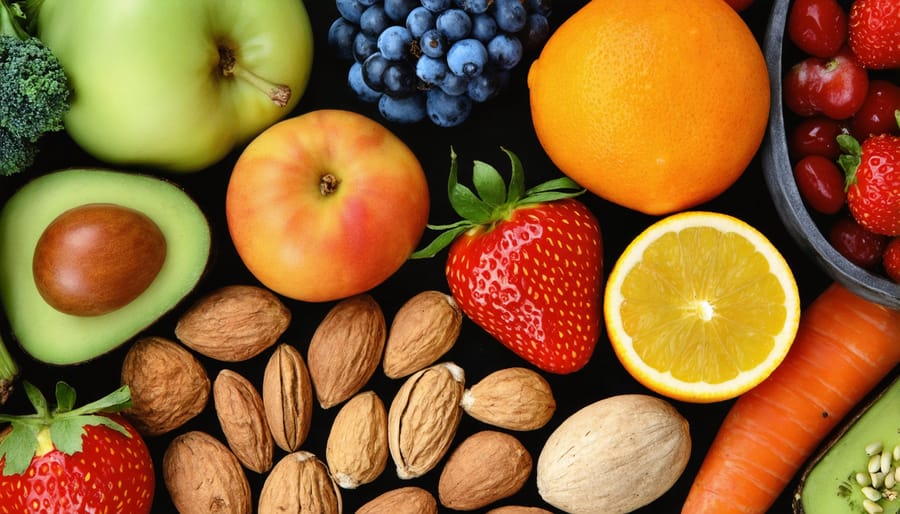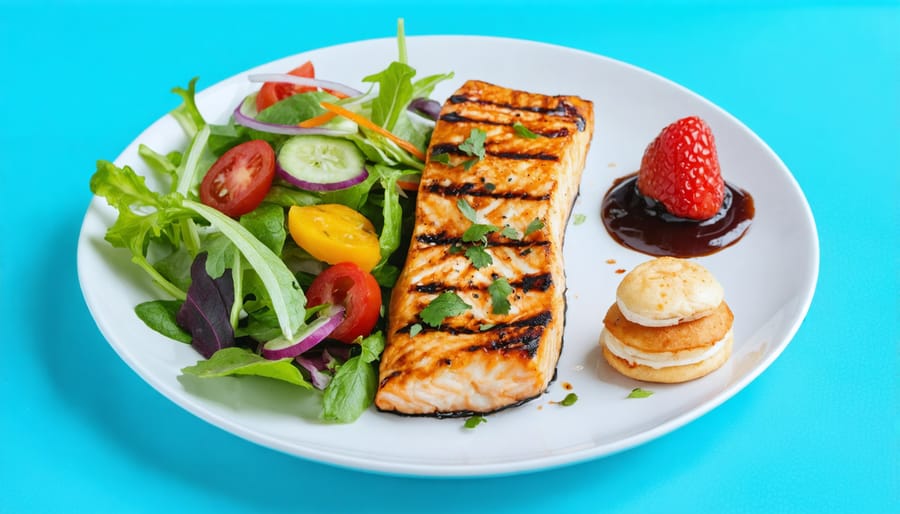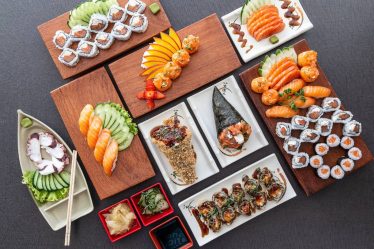
Embrace a holistic approach to nutrition, nourishing your body, mind, and spirit for optimal well-being. Fuel your body with nutrient-dense whole foods, focusing on colorful fruits and vegetables, lean proteins, and healthy fats to support vibrant health. Cultivate mindful eating habits, tuning into your body’s hunger and fullness cues, and savoring each bite with gratitude and presence. Prioritize self-care practices that enhance your overall health, such as regular exercise, stress management techniques, and sufficient sleep, recognizing their interconnectedness with your nutritional choices. By adopting a holistic perspective on nutrition, you empower yourself to make intentional, nurturing choices that promote balance, vitality, and long-term well-being.
Eat Real, Whole Foods

Go for Color
Nutrition isn’t just about counting calories – it’s about nourishing your body with a vibrant array of nutrients. One simple way to ensure you’re getting a diverse range of vitamins, minerals, and antioxidants is to eat a rainbow of fruits and vegetables. Each color represents different beneficial compounds. Red produce like tomatoes and watermelon contain lycopene, which supports heart health. Orange and yellow foods like carrots and squash are rich in vitamin A for eye and skin health. Leafy greens are packed with vitamin K, folate, and iron. Blue and purple options like berries and eggplant offer anthocyanins, powerful antioxidants. Aim to include at least three different colors on your plate at each meal. Not only does this optimize your nutritional intake, but it also makes your meals more visually appealing and exciting. Small shifts like these can have a big impact on your overall wellness.
Choose Healthy Fats
Healthy fats are essential for overall well-being, providing energy, supporting cell growth, and aiding nutrient absorption. Incorporate nourishing fats into your diet by reaching for nuts like almonds, walnuts, and cashews, which offer heart-healthy monounsaturated and polyunsaturated fats. Seeds such as chia, flax, and pumpkin are also excellent sources of omega-3 fatty acids. Avocados are a delicious and versatile way to add creamy, satisfying healthy fats to your meals. Fatty fish, including salmon, sardines, and mackerel, are rich in omega-3s, which support brain function and reduce inflammation. When cooking, opt for unrefined oils like extra virgin olive oil or coconut oil, which retain their beneficial properties. Remember, moderation is key – a little goes a long way when it comes to healthy fats. By mindfully incorporating these nourishing fats into your diet, you’ll support your body’s overall health and vitality.

Listen to Your Body
One of the most powerful tools for nurturing a healthy relationship with food is learning to listen to your body. By tuning into your hunger cues and fullness signals, you can start to understand what your body truly needs to thrive. This process involves becoming more mindful of how you feel before, during, and after eating.
Take a moment to check in with yourself before reaching for food. Are you experiencing physical hunger pangs, or are you driven by emotions, boredom, or external triggers? If it’s genuine hunger, honor that need by nourishing your body with wholesome, satisfying foods.
As you eat, pay attention to the flavors, textures, and aromas of your meal. Eat slowly and without distractions, allowing yourself to fully experience the pleasure of eating. Notice how your hunger dissipates and feelings of satisfaction emerge. Pause periodically to assess your fullness level, aiming to stop when you feel comfortably satisfied rather than overly stuffed.
Remember that everyone has unique nutritional needs based on factors like age, gender, activity level, and health status. What works for one person may not be optimal for another. Trust your body to guide you towards the foods and eating patterns that make you feel your best. This might involve some experimentation and fine-tuning over time, but the journey is worth it.
By cultivating a deeper awareness of your body’s signals and honoring your individual needs, you can lay the foundation for a more balanced, nourishing relationship with food. This mindful approach to eating is at the heart of holistic nutrition and can help you achieve not just better physical health, but greater overall well-being.
Embrace Balance, Not Perfection
When it comes to nutrition and holistic health, striving for perfection can often lead to stress and frustration. Instead, embrace the 80/20 rule: focus on nourishing your body with wholesome, nutrient-dense foods 80% of the time, while allowing yourself to enjoy treats and indulgences in moderation the other 20%.
This balanced approach acknowledges that life is meant to be enjoyed and that there’s room for the occasional slice of birthday cake or a cozy cup of hot chocolate on a chilly evening. By giving yourself permission to savor these moments without guilt, you’ll find it easier to maintain a healthy relationship with food and stay committed to your overall wellness goals.
Remember, the key is to make mindful choices most of the time, filling your plate with vibrant fruits and vegetables, lean proteins, whole grains, and healthy fats. When you do indulge, do so consciously and without judgment. By embracing balance rather than chasing perfection, you’ll discover a more sustainable and enjoyable path to holistic health.

Hydrate for Health
Water is the elixir of life, and staying hydrated is essential for maintaining optimal health. Our bodies are composed of approximately 60% water, making it a vital component in nearly every bodily function. When it comes to digestion, water plays a crucial role in breaking down food, absorbing nutrients, and keeping things moving smoothly through the digestive tract. Proper hydration also supports the body’s natural detoxification processes, helping to flush out toxins and waste products that can accumulate over time.
But the benefits of staying hydrated extend far beyond digestion and detoxification. Drinking enough water can boost energy levels, improve cognitive function, and even promote clearer, more radiant skin. Aim to drink at least 8 glasses of water per day, and listen to your body’s thirst cues to ensure you’re getting enough. If plain water isn’t your thing, try infusing it with fresh fruits, herbs, or cucumber slices for a refreshing twist. Remember, hydration is key to unlocking your body’s full potential and achieving optimal wellness from the inside out.
Nourish Your Gut
When it comes to nourishing your gut, one of the best things you can do is incorporate probiotic-rich foods into your diet. Probiotics are beneficial bacteria that help maintain a healthy balance in your digestive system, supporting everything from nutrient absorption to immune function. Some delicious probiotic-rich foods to try include yogurt, kefir, sauerkraut, kimchi, and kombucha. These fermented foods not only taste great but also offer a natural way to boost your gut health.
In addition to probiotics, it’s important to include plenty of fiber-rich foods in your diet. Fiber acts as a prebiotic, providing fuel for the good bacteria in your gut. Aim to include a variety of fiber sources, such as fruits, vegetables, whole grains, and legumes. Some particularly gut-friendly options include asparagus, garlic, onions, leeks, and bananas.
Remember, supporting your gut health is a journey, and everyone’s microbiome is unique. Listen to your body and pay attention to how different foods make you feel. By incorporating probiotic-rich foods and plenty of fiber into your diet, you’ll be well on your way to nurturing a happy, balanced gut. And when your gut is happy, you’ll feel the positive effects throughout your entire body and mind.
Eat Mindfully
In our fast-paced world, it’s easy to rush through meals without truly savoring the experience. However, practicing mindful eating can transform your relationship with food and enhance your overall well-being. Start by setting aside dedicated time for meals, free from distractions like screens or work. Take a moment to express gratitude for the nourishment before you, appreciating the journey it took to reach your plate. Engage your senses as you eat, noticing the colors, aromas, textures, and flavors of each bite. Chew slowly and thoroughly, allowing your body to register the food and begin the digestion process. Tune into your hunger and fullness cues, stopping when you feel comfortably satisfied rather than overly full. Remember, mindful eating is a practice, not a perfection. Be patient and kind with yourself as you learn to Eat Mindfully, one meal at a time. As you cultivate this presence and intention around food, you may find that you naturally make more nourishing choices, both for your body and your mind. Embrace the joy and connection that mindful eating can bring to your holistic health journey.
Make it a Lifestyle
Embracing holistic nutrition as a lifestyle means focusing on nourishing your body, mind, and soul through wholesome, nutrient-dense foods and positive habits. Rather than viewing it as a restrictive diet, approach it as an opportunity to explore new flavors, recipes, and ways of caring for yourself. Start by making small, sustainable changes, such as incorporating more fruits and vegetables into your meals, choosing whole grains over processed options, and staying hydrated with water throughout the day. As you become more comfortable with these adjustments, gradually introduce new healthy habits that resonate with you, such as trying plant-based protein sources, experimenting with herbs and spices, or practicing mindful eating. Remember, holistic nutrition is not about perfection but rather about finding a balanced approach that works for your unique needs and lifestyle. Celebrate your progress, be kind to yourself during setbacks, and enjoy the journey of discovering how nourishing your body can positively impact all aspects of your life. By embracing holistic nutrition as a lifestyle, you’ll cultivate a deeper sense of well-being and create sustainable habits that support your long-term health and happiness.
Embracing holistic nutrition is a journey, not a destination. Start by making small, manageable changes in your daily life. Swap out processed snacks for fresh fruits and vegetables, or experiment with a new wholesome recipe each week. Listen to your body and pay attention to how different foods make you feel. Remember, there’s no one-size-fits-all approach to nutrition. What works for someone else may not work for you, and that’s okay. Be patient with yourself and celebrate the little victories along the way. As you continue to nourish your body with whole, nutrient-dense foods, you’ll naturally start to feel more energized, balanced, and vibrant. Trust the process and enjoy the journey to a healthier, happier you. By making conscious choices and prioritizing your well-being, you’re taking a powerful step towards a more holistic lifestyle. Remember, every small change counts, and you have the power to transform your health one bite at a time.



